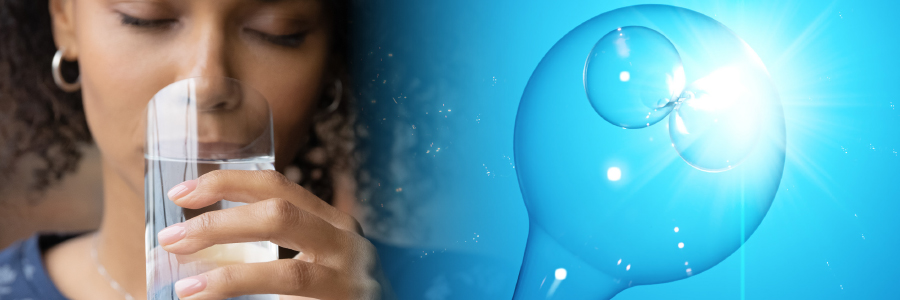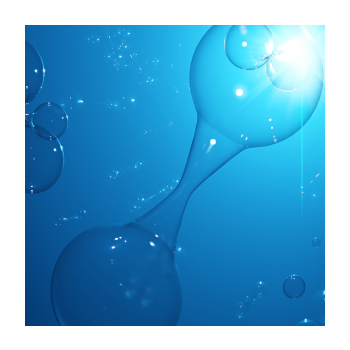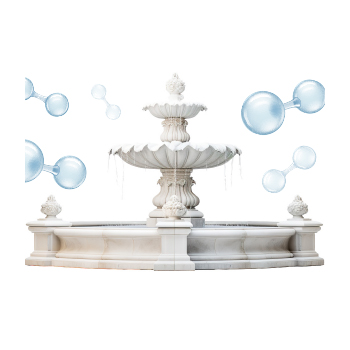A gas in its free form, molecular hydrogen (we’ll call it hydrogen for simplicity) was discovered to have significant antioxidant properties in 2007. Since then, a growing body of scientific research is showing that it has beneficial effects on pretty much the entire human body, including the reproductive, urinary, respiratory, digestive, cardiovascular, and central nervous systems, as well as skin health and metabolic health. In addition to being a powerful antioxidant, it is also anti-inflammatory, anti-apoptotic (prevents cell death), and positively influences gene expression.1 It has been studied in the treatment of a diverse range of human disease, from neurological diseases like Alzheimer’s and Parkinson’s, to cancer and osteoporosis. It also promotes healthy aging.2
Before we dive into the science to see exactly why this super nutrient is so unique, let’s take a look at some of its researched benefits.
Protection from head to toe, hydrogen is the way to go
With its multiple modes of action, as well as its ability to penetrate cell nuclei and the blood-brain barrier, hydrogen is proving to be invaluable to human health. Since its antioxidant properties were discovered in 2007, there have been at least 1,000 studies published on hydrogen and various diseases, with very promising results.
Some of the potential benefits of hydrogen being explored in both animal and human studies include:
- Neuroprotective, including protecting the brain from damage after traumatic brain injury or stroke, and protection from cognitive impairment as well as neurodegenerative diseases like Alzheimer’s and Parkinson’s.3 4 5 6 7 8 9 10
- Improving markers of metabolic syndrome, including body weight, glucose, insulin, and triglyceride levels. 11 12 13
- Supporting cardiovascular health.14 15 16
- Preserving kidney function.17 18 19
- Protecting against non-alcoholic fatty liver disease.20 21 22
- Improving athletic performance by improving measures such as time to exhaustion, perceived exertion, and delayed onset muscle soreness.23 24 25 26 27
- For skin conditions such as atopic dermatitis and psoriasis and for preventing UV-induced skin damage.28 29 30 31 32
With its numerous potential benefits on human health, it’s no surprise hydrogen is also being investigated as an anti-aging agent. One recent randomized controlled pilot study, including 40 men and women aged 70 and older, explored the effects of drinking hydrogen-rich water for six months. After six months, the researchers found that the group drinking the hydrogen-rich water had a significant increase (about 4%) in telomere length. Telomeres are the caps on the ends of our chromosomes that help stabilize and protect DNA; they shorten throughout our lifetime, and shortened telomeres are one of the hallmarks of aging. They also found that the hydrogen-rich water improved methylation (a biochemical process that impacts the regulation of biological processes throughout the body), lower body strength, general pain, brain metabolism, and sleep quality.33
Hydrogen is unique in the world of antioxidants
While most antioxidants work indiscriminately, and may react with reactive oxygen species (ROS) that have normal physiological functions, hydrogen selectively targets and neutralizes specific ROS, including hydroxyl radicals (OH) and peroxynitrite (ONOO), two “very strong oxidants,” making it unique among antioxidants. Because it is so small, it can also penetrate cell membranes to reach the very nucleus of a cell, which most antioxidants cannot do, and it also easily penetrates the blood-brain barrier, where it can provide antioxidant protection to brain cells. Administration of hydrogen has been shown to reduce a number of markers of oxidative stress in numerous disease models.34
In addition to its potent antioxidant effects, hydrogen also acts as an anti-inflammatory agent, and has been found to reduce pain and inflammation in a number of inflammatory diseases, from rheumatoid arthritis35 to irritable bowel disease.36
What even is an antioxidant?
Excessive oxidative stress is an underlying cause of nearly all degenerative diseases. It happens when there is an imbalance between the production and accumulation of ROS in cells and tissues, and the body’s inability to clear them out. ROS, also called free radicals, are generated via regular biological processes, like cellular energy production in the mitochondria, but can also be generated from exposure to things like UV light, pollution, stress, and inflammation. Excessive amounts of ROS damage lipids, cells, and tissues throughout the body (this is oxidative stress) and can eventually lead to cell death.39 This is where antioxidants come in. Antioxidants, both those made internally and those that we get from food or supplements, neutralize these ROS, preventing damage to cells and tissue. Our bodies have an endogenous antioxidant system in place that combats a lot of the free radicals produced within our bodies,40 but when that system becomes overloaded with too many ROS, that’s where external antioxidants, like hydrogen, can pick up the slack.
So maybe you’re ready to give hydrogen a try, but… how do you take a gas? The most convenient way to ingest hydrogen is via hydrogen-rich water, which you can safely and easily make with hydrogen tablets that dissolve in water. Hydrogen tablets have elemental magnesium added, which splits the hydrogen molecule off of the water molecule. For most purposes, research has found hydrogen-rich water to be as good, and sometimes even more effective, as inhalation of the gas. It shows no cytotoxicity (toxicity to cells) even at high concentrations.37 38
While it may not exactly be the fountain of youth, hydrogen is proving to be one of the most important—and safe—antioxidants available to us, truly affecting whole-body health. No matter what health issue you may be looking to improve, prevent, or support, hydrogen is it. After reading all of the research, this writer is ready to try it! Are you?
References
- Ge L., Yang, M., Yang, N., Yin, X., & Song, W. (2017). Molecular hydrogen: a preventive and therapeutic medical gas for various diseases. Oncotarget, 8(60), 102653–102673. https://doi.org/10.18632/oncotarget.21130
- Rahman, M. H., Jeong, E., You, H. S., Kim, C., & Lee, K. (2023). Redox-Mechanisms of molecular hydrogen promote healthful longevity. Antioxidants, 12(5), 988. https://doi.org/10.3390/antiox12050988
- Dohi, K., Draemer, B.C., Erickson, M.A., McMillan, P.J., Kovac, A., Flachbartova, Z., Hansen, K.M., Shah, G.N., Sheibani, N., Salameh, T., Banks, W.A. (2014). Molecular hydrogen in drinking water protects against neurodegenerative changes induced by traumatic brain injury. PLoS One, 9(9), e108034. doi: 10.1371/journal.pone.0108034
- Eckermann, J.M., Chen, W., Jadhay, V., Hsu, F.P.K., Colohan, A.R.T., Tang, J., Zhang, J.H. (2011). Hydrogen is neuroprotective against surgically induced brain injury. Med Gas Res, 1, 7. doi: 10.1186/2045-9912-1-7
- Ono, H., Nishijima, Y., Ohta, S., Sakamoto, M., Kinone, K., Horikosi, T., Tamaki, M., Takeshita, H., Futatuki, T., Ohishi, W., Ishiguro, T., Okamoto, S., Ishii, S., & Takanami, H. (2017). Hydrogen Gas Inhalation Treatment in Acute Cerebral Infarction: A Randomized Controlled Clinical Study on Safety and Neuroprotection. Journal of stroke and cerebrovascular diseases : the official journal of National Stroke Association, 26(11), 2587–2594. https://doi.org/10.1016/j.jstrokecerebrovasdis.2017.06.012
- Ono, H., Nishijima, Y., Ohta, S., Sakamotoa, M., Kinone, K., Horikosi, T., Tamaki, M., Takeshita, H., Futatuki, T., Ohishi, W., Isiguro, T., Okamoto, S., Ishii, S., Takanami, H. (2017). Hydrogen gas inhalation treatment in acute cerebral infarction: a randomized controlled clinical study on safety and neuroprotection. J Stroke Cerebrovasc Dis 26(11), 2587-2594. DOI: 10.1016/j.jstrokecerebrovasdis.2017.06.012
- Gu, Y., Huang, C.S., Inoue, T., Yamashita, T., Ishida, T., Kang, K.M., Nakao, A. (2010). Drinking hydrogen water ameliorated cognitive impairment in senescence-accelerated mice. J Clin Biochem Nutr, 46(3), 269-276. doi: 10.3164/jcbn.10-19
- Yoritaka, A., Takanashi, M., Hirayama, M., Nakahara, T., Ohta, S., Hattori, N. (2013). Pilot study of H2 therapy in Parkinson’s disease: a randomized double-blind placebo-controlled trial. Mov Discord, 28(6), 836-839. DOI: 10.1002/mds.25375
- Fu, Y., Ito, M., Fujita, Y., Ito, M., Ichihara, M., Masuda, A., Suzuki, Y., Maesawa, S., Kajita, Y., Hirayama, M., Ohsawa, I., Ohta, S., & Ohno, K. (2009). Molecular hydrogen is protective against 6-hydroxydopamine-induced nigrostriatal degeneration in a rat model of Parkinson's disease. Neuroscience letters, 453(2), 81–85. https://doi.org/10.1016/j.neulet.2009.02.016
- Iketani, M., Ohsawa, I. (2017). Molecular hydrogen as a neuroprotective agent. Curr Neuropharmacol, 15(2), 324-331. doi: 10.2174/1570159X14666160607205417
- Nakao, A., Toyoda, Y., Sharma, P., Evans, M., Guthrie, N. (2010). Effectiveness of hydrogen rick water on antioxidant status of subjects with potential metabolic syndrome—an open label pilot study. J Clin Biochem Nutr, 46(2), 140-149. doi: 10.3164/jcbn.09-100
- Song, G., Li, M., Sang, H., Zhang, L., Li, X., Yao, S., Yu, Y., Zong, C., Xue, Y., Qin, S. (2013). Hydrogen-rich water decreases serum LDL-cholesterol levels and improves HDL function in patients with potential metabolic syndrome. J Lipid Res, 54(7), 1884-1893. doi: 10.1194/jlr.M036640
- Kamimura, N., Nishimaki, K., Ohsawa, I., & Ohta, S. (2011). Molecular hydrogen improves obesity and diabetes by inducing hepatic FGF21 and stimulating energy metabolism in db/db mice. Obesity (Silver Spring, Md.), 19(7), 1396–1403. https://doi.org/10.1038/oby.2011.6
- Si, Y., Tian, H., Dong, B., Zhang, Y., Wen, Y., Jia, X., Li, Y., Zhang, A., & Qin, S. (2021). Effects of hydrogen as adjuvant treatment for unstable angina. Experimental biology and medicine (Maywood, N.J.), 246(18), 1981–1989. https://doi.org/10.1177/15353702211009138
- Sakai, T., Sato, B., Hara, K., Hara, Y., Naritomi, Y., Koyanagi, S., Hara, H., Nagao, T., & Ishibashi, T. (2014). Consumption of water containing over 3.5 mg of dissolved hydrogen could improve vascular endothelial function. Vascular health and risk management, 10, 591–597. https://doi.org/10.2147/VHRM.S68844
- Katsumata, Y., Sano, F., Abe, T., Tamura, T., Fujisawa, T., Shiraishi, Y., Kohsaka, S., Ueda, I., Homma, K., Suzuki, M., Okuda, S., Maekawa, Y., Kobayashi, E., Hori, S., Sasaki, J., Fukuda, K., & Sano, M. (2017). The Effects of Hydrogen Gas Inhalation on Adverse Left Ventricular Remodeling After Percutaneous Coronary Intervention for ST-Elevated Myocardial Infarction - First Pilot Study in Humans. Circulation journal : official journal of the Japanese Circulation Society, 81(7), 940–947. https://doi.org/10.1253/circj.CJ-17-0105
- Matsushita, T., Kusakabe, Y., Kitamura, A., Okada, S., & Murase, K. (2011). Protective effect of hydrogen-rich water against gentamicin-induced nephrotoxicity in rats using blood oxygenation level-dependent MR imaging. Magnetic resonance in medical sciences : MRMS : an official journal of Japan Society of Magnetic Resonance in Medicine, 10(3), 169–176. https://doi.org/10.2463/mrms.10.169
- Kitamura, A., Kobayashi, S., Matsushita, T., Fujinawa, H., & Murase, K. (2010). Experimental verification of protective effect of hydrogen-rich water against cisplatin-induced nephrotoxicity in rats using dynamic contrast-enhanced CT. The British journal of radiology, 83(990), 509–514. https://doi.org/10.1259/bjr/25604811
- Xin, H. G., Zhang, B. B., Wu, Z. Q., Hang, X. F., Xu, W. S., Ni, W., Zhang, R. Q., & Miao, X. H. (2014). Consumption of hydrogen-rich water alleviates renal injury in spontaneous hypertensive rats. Molecular and cellular biochemistry, 392(1-2), 117–124. https://doi.org/10.1007/s11010-014-2024-4
- Jackson, K., Dressler, N., Ben-Shushan, R. S., Meerson, A., LeBaron, T. W., & Tamir, S. (2018). Effects of alkaline-electrolyzed and hydrogen-rich water, in a high-fat-diet nonalcoholic fatty liver disease mouse model. World journal of gastroenterology, 24(45), 5095–5108. https://doi.org/10.3748/wjg.v24.i45.5095
- Kawai, D., Takaki, A., Nakatsuka, A., Wada, J., Tamaki, N., Yasunaka, T., Koike, K., Tsuzaki, R., Matsumoto, K., Miyake, Y., Shiraha, H., Morita, M., Makino, H., & Yamamoto, K. (2012). Hydrogen-rich water prevents progression of nonalcoholic steatohepatitis and accompanying hepatocarcinogenesis in mice. Hepatology (Baltimore, Md.), 56(3), 912–921. https://doi.org/10.1002/hep.25782
- Korovljev, D., Stajer, V., Ostojic, J., LeBaron, T. W., & Ostojic, S. M. (2019). Hydrogen-rich water reduces liver fat accumulation and improves liver enzyme profiles in patients with non-alcoholic fatty liver disease: a randomized controlled pilot trial. Clinics and research in hepatology and gastroenterology, 43(6), 688–693. https://doi.org/10.1016/j.clinre.2019.03.008
- Jebabli, N., Ouerghi, N., Abassi, W., Yagin, F. H., Khlifi, M., Boujabli, M., Bouassida, A., Ben Abderrahman, A., & Ardigò, L. P. (2023). Acute effect of hydrogen-rich water on physical, perceptual and cardiac responses during aerobic and anaerobic exercises: a randomized, placebo-controlled, double-blinded cross-over trial. Frontiers in physiology, 14, 1240871. https://doi.org/10.3389/fphys.2023.1240871
- Botek, M., Khanna, D., Krejčí, J., Valenta, M., McKune, A., Sládečková, B., Klimešová, I. (2022). Molecular hydrogen mitigates performance decrement during repeated sprints in professional soccer players. Nutrients, 14(3), 508. doi: 10.3390/nu14030508
- Dong, G., Fu, J., Bao, D., Zhou, J. (2022). Short-term consumption of hydrogen-rick water enhances power performance and heart rate recovery in dragon boat athletes: evidence from a pilot study. Int J Environ Res Public Health, 19(9), 5413. DOI: 10.3390/ijerph1909541
- Botek, M., Krejčí, J., McKune, A., Valenta, M., Sládečková, B. (2022). Hydrogen rich water consumption positively affecs muscle performance, lactate response, and alleviates delayed onset muscle of muscle soreness after resistance training. J Strength Cond Res, 36(10), 2792-2799. DOI: 10.1519/JSC.0000000000003979
- Bokek, M., Krejčí, J., McKune, A.J., Sládečková, B., Naumovski, N. (2019). Hydrogen rich water improved ventilatory, perceptual and lactate responses to exercise. Int J Sports Med, 40(14), 879-885. DOI: 10.1055/a-0991-0268
- Ignacio, R. M., Kwak, H. S., Yun, Y. U., Sajo, M. E., Yoon, Y. S., Kim, C. S., Kim, S. K., & Lee, K. J. (2013). The Drinking Effect of Hydrogen Water on Atopic Dermatitis Induced by Dermatophagoides farinae Allergen in NC/Nga Mice. Evidence-based complementary and alternative medicine : eCAM, 2013, 538673. https://doi.org/10.1155/2013/538673
- Kajisa, T., Yamaguchi, T., Hu, A., Suetake, N., Kobayashi, H. (2017). Hydrogen water ameliorates the severity of atopic dtermatitis-like lesions and decreases interleukin -1β, interleukin-33, and mast cell infiltration in NC/Nga mice. Saudi Med J. 38(9), 928-933. doi: 10.15537/smj.2017.9.20807
- Ishibashi, T., Ichikawa, M., Sato, B., Shibata, S., Hara, Y., Naritomi, Y., Okazaki, K., Nakashima, Y., Iwamoto, Y., Koyanagi, S., Hara, H., & Nagao, T. (2015). Improvement of psoriasis-associated arthritis and skin lesions by treatment with molecular hydrogen: A report of three cases. Molecular medicine reports, 12(2), 2757–2764. https://doi.org/10.3892/mmr.2015.3707
- Zhu, Q., Wu, Y., Li, Y., Chen, Z., Wang, L., Xiong, H., Dai, E., Wu, J., Fan, B., Ping, L., Luo, X. (2018). Positive effects of hydrogen-water bathing in patients of psoriasis and parapsoriasis en plaques. Sci Rep, 8051. DOI https://doi.org/10.1038/s41598-018-26388-3
- Kato, S., Saitoh, Y., Iwai, K., & Miwa, N. (2012). Hydrogen-rich electrolyzed warm water represses wrinkle formation against UVA ray together with type-I collagen production and oxidative-stress diminishment in fibroblasts and cell-injury prevention in keratinocytes. Journal of photochemistry and photobiology. B, Biology, 106, 24–33. https://doi.org/10.1016/j.jphotobiol.2011.09.006
- Zanini, D., Todorović, N., Korovljev, D., Štajer, V., Ostojić, J., Purać, J., Kojić, D., Vukašinović, E. L., Djordjievski, S., Sopić, M., Guzonjić, A., Ninić, A., Erceg, S., & Ostojić, S. M. (2021). The effects of 6-month hydrogen-rich water intake on molecular and phenotypic biomarkers of aging in older adults aged 70 years and over: A randomized controlled pilot trial. Experimental Gerontology, 155, 111574. https://doi.org/10.1016/j.exger.2021.111574
- Ge L., Yang, M., Yang, N., Yin, X., & Song, W. (2017b). Molecular hydrogen: a preventive and therapeutic medical gas for various diseases. Oncotarget, 8(60), 102653–102673. https://doi.org/10.18632/oncotarget.21130
- Ishibashi, T., Sato, B., Rikitake, M., Seo, T., Kurokawa, R., Hara, Y., Naritomi, Y., Hara, H., & Nagao, T. (2012). Consumption of water containing a high concentration of molecular hydrogen reduces oxidative stress and disease activity in patients with rheumatoid arthritis: an open-label pilot study. Medical Gas Research, 2(1), 27. https://doi.org/10.1186/2045-9912-2-27
- Hu, D., Huang, T., Shigeta, M., Ochi, Y., Kabayama, S., Watanabe, Y., & Cui, Y. (2022). Electrolyzed Hydrogen Water Alleviates Abdominal Pain through Suppression of Colonic Tissue Inflammation in a Rat Model of Inflammatory Bowel Disease. Nutrients, 14(21), 4451. https://doi.org/10.3390/nu14214451
- Ge, L., Yang, M., Yang, N. N., Yin, X. X., & Song, W. G. (2017). Molecular hydrogen: a preventive and therapeutic medical gas for various diseases. Oncotarget, 8(60), 102653–102673. https://doi.org/10.18632/oncotarget.21130
- Ichihara, M., Sobue, S., Ito, M., Ito, M., Hirayama, M., Ohno, K. (2015). Beneficial biological effects and the underlying mechanisms of molecular hydrogen – comprehensive review of 321 original articles. Med Gas Res, 5, 12. doi: 10.1186/s13618-015-0035-
- Pizzino, G., Irrera, N., Cucinotta, M., Pallio, G., Mannino, F., Arcoraci, V., Squadrito, F., Altavilla, D., & Bitto, A. (2017). Oxidative Stress: Harms and Benefits for Human Health. Oxidative Medicine and Cellular Longevity. https://doi.org/10.1155/2017/8416763
- Kurutaş, E. B. (2015). The importance of antioxidants which play the role in cellular response against oxidative/nitrosative stress: current state. Nutrition Journal, 15(1). https://doi.org/10.1186/s12937-016-0186-5









